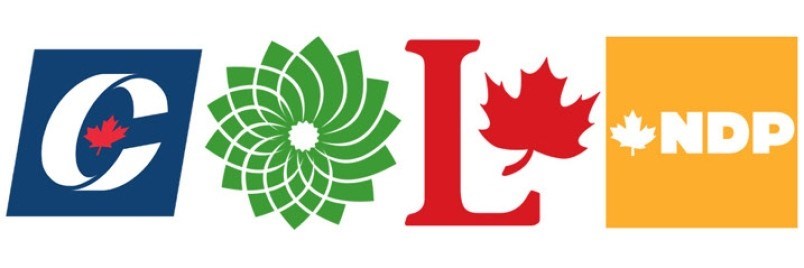Federal parties have spent weeks laying the foundations for their campaign and the promises they intend to make to address a suite of issues they believe are at the tops of voters' minds.
You've likely already heard references to what is to come: The cost of living is too high, so we'll make it easier for you to manage your household budget; climate change needs to be addressed, and we'll make sure that happens.
You may have heard some specifics, particularly when it comes to balancing the federal budget - and how it won't be possible in the life of one government.
Here's a running list of specific promises made by the Liberals, Conservatives, NDP and Greens since the official start of the campaign on Sept. 11.
Liberals
Sept. 16: Spend at least $535 million per year to help create up to 250,000 more spaces for children in before- and after-school child-care programs, reduce fees parents pay for elementary school programs by 10 per cent, and ensure 10 per cent of new spaces go to parents who work outside normal hours.
Sept. 13: Eliminate the "swipe fee" merchants pay to credit-card companies on every transaction, reduce the cost of federal incorporation, make federal business advisory services fee-free, create a voluntary payroll system to automate records for small businesses, launch a pilot project to give up to $50,000 to up to 2,000 entrepreneurs to help them start businesses, and give $250 for new businesses to develop a website or e-commerce platform.
Sept. 12: Impose a national one-per-cent tax on properties owned by non-Canadians and non-residents; raise the value of homes allowed under the First-Time Home Buyer Incentive to $789,000 from $505,000.
Conservatives
Sept. 16: Provide up to $150 back on taxes per child up to age 16 enrolled in sports and fitness classes. Provide up to $75 back on taxes per child up to age 16 in an arts and learning program, such as dance classes, drawing or after-school tutoring.
Sept. 15: Cut the tax rate on the lowest federal income bracket (up to $47,630) from 15 per cent to 13.75 per cent over four years, which the party says would save a two-income couple earning average salaries about $850 a year.
Sept. 13: Reintroduce a 15-per-cent Green Public Transit Tax Credit that would apply at tax time to any transit pass allowing for unlimited travel within Canada on local buses, streetcars, subways, commuter trains, and ferries, as well as electronic fare cards when used for an extended period.
Sept. 12: Remove federal income tax from maternity and parental benefits under employment insurance, by providing a tax credit of 15 per cent for any income earned under these two programs.
NDP
Sept. 15: Give Quebec new funding to help integrate immigrants, increased powers in areas such as environmental assessment and trade agreements, expand the province's language law, Bill 101, to cover all federally regulated companies in Quebec, the right to withdraw from federal programs with financial compensation. Also, let Quebec sign the Constitution on its own terms.
Sept. 14: Establish a National Automotive Strategy, including a $300 million Auto Innovation Fund. Purchase Canadian-made zero-emissions vehicles to update government fleets. Increase consumer incentives for zero-emissions vehicles to $15,000 from $5,000, but only for made-in-Canada vehicles.
Create a Canadian Food Strategy to help build local food hubs that link local producers to consumers, and community-supported agriculture.
Sept. 13: Put a price cap on cellphone and internet services, introduce a Telecom Consumers' Bill of Rights, require service providers to offer basic plans and affordable unlimited data plans for cellphones, end caps for internet plans.
Sept. 12: Work with province and municipality to get built a hospital in Brampton, Ont.
Greens
Sept. 16: View all policy through the lens of the climate crisis: the economy, health, education, foreign affairs, immigration, public safety, defence, social welfare, transportation.
Re-introduce legislation to enshrine the United Nations Declaration on the Rights of Indigenous Peoples (UNDRIP) in Canadian law and implement the calls to action from the Truth and Reconciliation Commission and the Inquiry into Missing and Murdered Indigenous Women and Girls.
Create universal pharmacare and dental coverage for low-income Canadians.
Eliminate post-secondary tuition fees and forgive federal student debt.
Create a "guaranteed livable income" program.
Set the federal minimum wage at $15 per hour.
Require a 60-per-cent cut in Canada's greenhouse-gas emissions below 2005 levels by 2030, reaching net zero in 2050; have 100 per cent of Canada's electricity come from renewable sources by 2030; ban the sale of cars with combustion engines by 2030.
End pipeline, coal, oil or gas drilling and mining approvals, cancel the Trans Mountain pipeline and fossil-fuel subsidies.
Ban the production, distribution and sale of unnecessary or non-essential petroleum-based single-use plastics by 2022.
Decriminalize drug possession and lower the federally set price for cannabis to make it competitive with illegal supplies.
Eliminate mandatory minimum criminal sentences.
Ensure that the 2019 election is the last "first past the post" election and lower the voting age to 16.
Apply a corporate tax on transnational e-commerce companies doing business in Canada such as Netflix, Facebook, Amazon, Google, and Uber.
Increase the federal corporate tax rate from 15 to 21 per cent.
Limit credit-card interest rates to a maximum of 10 percentage points above the Bank of Canada prime rate, and limit ATM fees to $1 per transaction, as well as ban financial institutions from charging their own customers ATM fees.
Study the impacts of adopting a shorter work week.
Reform anti-trust laws to enable the break-up of media conglomerates, increase funding to CBC and Radio-Canada by $315 million per year until the per-capita level of funding is equal to that of the BBC.
Eliminate the first-time home-buyer grant.
For original story go here:



